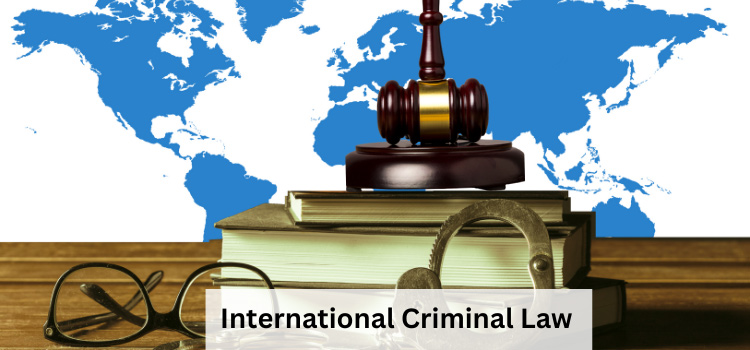International Criminal Law
Posted On : June 30, 2023

Table of Contents
Introduction
International Criminal Law (ICL) serves as a crucial pillar in the global pursuit of justice, holding individuals accountable for the most heinous crimes committed against humanity. International criminal law is a specialized legal field that seeks to establish accountability for individuals who commit grave offenses that impact the international community as a whole. It represents a crucial pillar of the international legal framework, promoting justice, upholding human rights, and deterring heinous crimes. This article explores the key aspects of international criminal law, its history, core principles, major international tribunals, and its ongoing challenges.
What is International Criminal Law (ICL)?
Genocide, war crimes, crimes against humanity, and the act of aggression are only a few examples of the international crimes that are defined under international criminal law (ICL), which also codifies the procedures to be followed before international courts and tribunals. These crimes frequently occur during times of war and so have a direct bearing on humanitarian crises. ICL establishes individual criminal responsibility rather than focusing on the actions of States, which is contrary to much international law. The Rome Statute that established the International Criminal Court (ICC) is one of the primary sources of ICL.
Historical Development
The roots of international criminal law can be traced back to ancient civilizations where customary practices and treaties sought to address crimes against humanity. However, it was not until the aftermath of World War II that the modern framework for international criminal law began to take shape. The Nuremberg and Tokyo Trials, held respectively for Nazi war criminals and Japanese officials, laid the foundation for prosecuting individuals responsible for the most egregious offenses on a global scale.
Key Principles and Institutions
-
Universal Jurisdiction
International criminal law operates under the principle of universal jurisdiction, which empowers states to prosecute individuals for serious crimes, regardless of the location of the offense or the nationality of the perpetrator or victim. This principle acts as a deterrent, ensuring that perpetrators do not find safe havens and allowing justice to be served. -
International Criminal Court (ICC)
The ICC, established in 2002 under the Rome Statute, is the first permanent international criminal court with the jurisdiction to prosecute individuals for genocide, war crimes, crimes against humanity, and the crime of aggression. The ICC serves as a central institution for ensuring accountability and provides a forum for victims to seek justice. -
Ad hoc Tribunals
Ad hoc tribunals, such as the International Criminal Tribunal for the former Yugoslavia (ICTY) and the International Criminal Tribunal for Rwanda (ICTR), were established by the United Nations Security Council to address specific conflicts and crimes. These tribunals have played a crucial role in prosecuting individuals responsible for mass atrocities committed during the Yugoslav Wars and the Rwandan Genocide. -
Hybrid and Specialized Tribunals
In addition to the ICC and ad hoc tribunals, various hybrid and specialized courts have been established to address specific conflicts and crimes. These include the Special Court for Sierra Leone, the Extraordinary Chambers in the Courts of Cambodia, and the Special Tribunal for Lebanon. These tribunals combine international and domestic legal systems, fostering cooperation and strengthening national judicial capacities.
Challenges and Criticisms
While international criminal law has made significant strides, it faces several challenges and criticisms:
-
Limited Jurisdiction
The ICC's jurisdiction is limited to crimes committed after its establishment in 2002. As a result, it cannot prosecute crimes committed before that time, which limits its ability to address historical injustices. -
Lack of Universality
Not all countries are party to the Rome Statute or accept the jurisdiction of the ICC. This lack of universality hampers the court's ability to fully exercise its mandate and creates gaps in accountability. -
Enforcement and Cooperation
Arresting and transferring suspects to international criminal courts can be challenging due to issues of state sovereignty, lack of cooperation, and political obstacles. Ensuring the enforcement of court rulings and the apprehension of fugitives remains a significant hurdle. -
Criticism of Selectivity
International criminal law has faced criticism for its perceived selectivity in prosecuting individuals. Some argue that powerful states are shielded from prosecution, leading to a perception of victor's justice.
Conclusion
International Criminal Law plays a crucial role in holding perpetrators accountable for the gravest crimes against humanity. It represents the collective global effort to ensure justice, deter future atrocities, and provide redress to victims. While facing challenges and criticisms, international criminal tribunals and courts continue to evolve and adapt, contributing to the development of a more just and peaceful world. Through continued international cooperation and support, the pursuit of justice can be strengthened, and the principles of international criminal law can be upheld on a global scale. Today, there are a large number of international lawyers in India who deal with such situations. Also, criminal lawyers can provide better consultation in such cases. However, it is better to consult a criminal lawyer in your relevant jurisdiction to get better results. In simple word, a person residing in Kolkata must consult a criminal lawyer in Kolkata.
FAQs
-
What is the purpose of the international criminal law?
International criminal law (ICL) is a corpus of public international law created to outlaw specific types of behavior that are frequently considered to be major atrocities and to hold those who commit such behavior criminally responsible for their actions. -
What are the four crimes in international law?
Genocide, war crimes, crimes against humanity, and acts of aggression are considered the four main types of crimes under international law. -
How do I become an international criminal lawyer?
The following are the steps which must be fulfilled to become an international criminal lawyer;- Getting into Law School
- Preparing for Law School Applications
- Selection of a Law School
- Getting a Law Degree
- Getting Your First Job as an International Attorney
-
What is the difference between domestic and international criminal law?
International criminal law differs from domestic criminal law in that it punishes particularly egregious crimes that have the potential to cause widespread harm (like crimes against humanity or genocide) and crimes that can be considered "international" in that they involve actions.






















